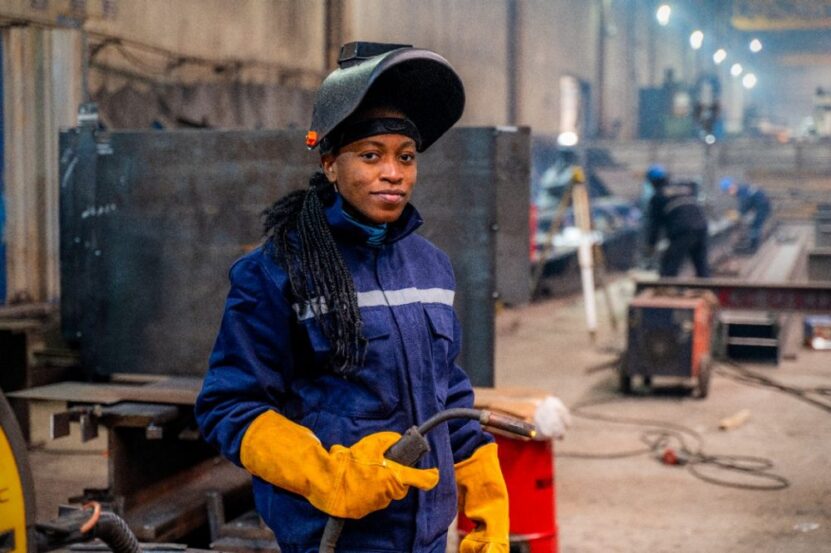
Share Post:
Welding offers exciting opportunities for individuals interested in hands-on, technical work.
To succeed in this field, it’s essential to follow a structured approach to education, training, and certification while keeping up with industry developments.
Here’s how you can get started, in case you are interested in changing your career.
Table of Contents
ToggleExplore Welding Specializations
A career as a welder offers various specializations, allowing individuals to focus on areas that match their skills, interests, and long-term career goals.
Welding professionals can choose fields ranging from industrial projects to cutting-edge technologies.
By understanding the distinctions between these fields, aspiring welders can strategically plan their career paths.
Some of the most prominent welding specializations include:
Pipeline
Pipeline welders play a crucial role in building and maintaining the infrastructure that transports oil, gas, and water. This specialization often involves:
- Working in outdoor environments.
- Traveling to remote locations for projects.
- Performing welds on pipelines under strict safety standards.
- Earning competitive wages due to the demanding conditions.
Aerospace
Welders in the aerospace industry focus on precision and high-quality results, as their work impacts the safety of aircraft and spacecraft. Key aspects of this field include:
- Working on advanced machinery and specialized materials like titanium and aluminum.
- Developing expertise in TIG (Tungsten Inert Gas) welding for precision.
- Participating in projects involving military and commercial aviation, satellites, and rockets.
Underwater
This highly specialized field combines welding expertise with diving skills. Underwater welders work on submerged structures such as ship hulls, pipelines, and offshore platforms. Key features include:
- High earning potential due to the risks and technical requirements.
- Certification as both a welder and a commercial diver.
- Opportunities in industries such as marine construction, oil and gas, and ship repair.
Structural
Structural welders focus on large-scale construction projects like bridges, buildings, and stadiums. Their responsibilities include:
- Joining steel beams and other materials to ensure structural stability.
- Working in various environments, from urban sites to remote areas.
- Collaborating with construction teams to meet safety and engineering standards.
Industrial Maintenance
Industrial maintenance welders specialize in repairing and maintaining machinery used in factories and production facilities. Their duties often involve:
- Diagnosing and fixing damaged equipment.
- Welding components to minimize downtime in production.
- Enhancing the longevity and efficiency of industrial machines.
Artistic Welding
For creative professionals, artistic welding offers opportunities to design sculptures, furniture, and decorative pieces. Features of this specialization include:
- Combining technical welding skills with artistic vision.
- Using a variety of metals to create functional or purely aesthetic works.
- Working independently or collaborating with architects and designers.
Educational Foundation
A strong educational background lays the groundwork for anyone aspiring to become a successful welder. The first step is obtaining a high school diploma or GED, which provides the essential foundation for further training.
Certain subjects are especially critical in preparing for a career in welding:
- Mathematics: Develops problem-solving skills, vital for measurements, angles, and blueprint reading.
- Physics: Explains the science behind heat, metal properties, and welding techniques.
- Chemistry: Offers insight into how metals react to different conditions and materials.
These subjects not only build fundamental skills but also prepare future welders for technical challenges.
Once secondary education is complete, aspiring welders should consider post-secondary vocational programs or community college courses focused on welding. Vocational schools and technical institutions, such as AMTEC, provide tailored programs that combine theoretical knowledge with hands-on experience. These programs cover key aspects such as:
- Gain familiarity with techniques like MIG, TIG, and arc welding.
- Learn the importance of personal protective equipment and workplace safety standards.
- Understand and interpret welding specifications outlined in technical drawings.
- Operate welding machines, torches, and other tools effectively.
Choosing the right program is critical for gaining the skills and confidence needed to enter the workforce. Many vocational schools also offer resources such as mentorship opportunities and career placement assistance, which can provide a head start for new welders.
Certification
Certifications play an essential role in defining a welder’s career path. They not only establish credibility but also significantly enhance employability in a competitive job market. Employers often prioritize certified welders because these credentials validate expertise, skill proficiency, and adherence to industry standards.
Obtaining certifications demonstrates a welder’s commitment to professional growth and capability in handling demanding tasks.
Organizations like the American Welding Society (AWS) are at the forefront of providing recognized certifications tailored to various welding specializations. Some of the most sought-after certifications for welders include:
- Certified Welder (CW): This certification assesses a welder’s ability to perform welding tasks according to specific codes and standards. It demonstrates proficiency in different welding methods and is widely recognized in the industry.
- Certified Welding Inspector (CWI): For those who wish to expand into inspection roles, this certification focuses on ensuring weld quality, safety, and adherence to design specifications.
Specialized Certifications:
- Robotic Welding Certification: For welders skilled in automated welding systems and advanced robotics.
- Structural Welding Certification: For welders working on critical infrastructure, such as bridges and buildings.
- Pipe Welding Certification: Aimed at those working in industries like oil, gas, and utilities.
Preparing for welding certifications typically involves two components:
- Written Exams: These assess a welder’s theoretical knowledge of welding techniques, materials, and safety protocols.
- Practical Tests: These evaluate hands-on skills to ensure that a welder can meet real-world challenges.
Job Search
Landing your first job as a welder requires focused effort and preparation. The job market can be competitive, but with the right approach, you can secure an opportunity that sets you on a path for career growth.
Here’s how you can enhance your chances of success in starting your professional journey as a welder:
Build a Strong Resume and Cover Letter
Your resume and cover letter are your first impression with potential employers. These documents should effectively showcase your skills and accomplishments:
- Highlight Training: List any vocational or technical training programs you’ve completed, such as welding courses or certifications.
- Emphasize Certifications: Mention credentials like those from the American Welding Society (AWS), which add credibility to your expertise.
- Showcase Practical Experience: Include any apprenticeships, internships, or hands-on projects that demonstrate your ability to perform as a welder.
- Tailor Your Application: Customize your resume and cover letter to match the specific job requirements listed in the job posting.
Search for Welding Job Opportunities
Finding the right openings requires effort and resourcefulness. Use a variety of platforms and strategies to locate suitable positions:
- Job Boards: Websites like Indeed, Monster, and Glassdoor often list entry-level welding positions across industries.
- Local Resources: Check community job boards or local welding companies’ websites for openings.
- Social Media: Join groups or forums focused on welders, where job opportunities are often shared.
Leverage Networking
Your professional connections can be a valuable resource in your job search:
- Instructors and Mentors: Ask your welding instructors or mentors if they know of any companies hiring welders.
- Peers: Fellow students or colleagues may have leads on entry-level welding positions.
- Industry Events: Attend welding expos, trade shows, or job fairs to connect directly with hiring managers.
Summary
A career in welding requires dedication, continuous learning, and practical experience.
By following a structured path that includes education, training, certification, and professional development, you can build a successful career in this dynamic industry.
Related Posts:










